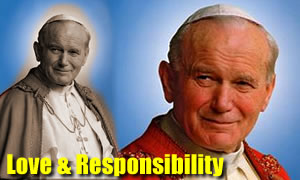


 Editor’s Note: This is the fifth in a series of articles written by Dr. Edward Sri on Saint John Paul II’s Love and Responsibility.
Editor’s Note: This is the fifth in a series of articles written by Dr. Edward Sri on Saint John Paul II’s Love and Responsibility.
The following is based on Dr. Sri's book, Men, Women and the Mystery of Love
That's what John Paul II then Karol Wojtyla addresses in the next section of his book, Love and Responsibility, when he discusses the two sides of love.
According to Wojtyla, there are two aspects of love, and understanding the difference is crucial for any marriage, engagement, or dating relationship. On one hand, we have what's happening inside us when we're attracted to a person of the opposite sex.
When boy meets girl, he experiences a number of powerful feelings and desires in his heart. He may find himself physically drawn to the beauty of her body or constantly thinking about her in an emotional attraction. This inner dynamic of sensual desire (sensuality) and emotional love (sentimentality) largely shapes how the man and woman interact with each other, and it is what makes romance, especially in its early stages, so thrilling for the couple involved. Wojtyla calls this first side of love the "subjective" aspect.
Yet, while this is one aspect of love, it is not to be equated with love in the fullest sense. We know from experience that we can have powerful emotions and desires for another person without in any way being committed to them or without them being truly committed to us in a relationship of love.
This is why Wojtyla puts the subjective aspect of love in its proper place. He wakes us up and reminds us that no matter how intensely we experience these sensations, it is not necessarily love, but simply "a psychological situation." In other words, on its own, the subjective aspect of love is no more than a pleasurable experience happening inside of me.
These emotions and desires are not bad, and they may develop into love and even enrich love, but we should not view them as infallible signs of authentic love. Wojtyla says, "It is impossible to judge the value of a relationship between persons merely from the intensity of their emotions. . . . Love develops on the basis of the totally committed and fully responsible attitude of a person to a person"; whereas, romantic feelings "are born spontaneously from sensual and emotional reactions. A very rich and rapid growth of such sensations may conceal a love which has failed to develop" (p. 145).
Turning Love Inward
Men and women today are quite susceptible to falling for this illusion of love, for the modern world has turned love inward, focusing primarily on the subjective aspect. In the last article, I wrote about the phenomenon of "Hollywood Love," which tells us that the stronger our feelings are the stronger our love is. Wojtyla, however, emphasizes that there is another side of love that is absolutely essential no matter how powerful our emotions and desires may be. This is what he calls love's "objective" aspect.
Does the other person truly love me more for who I am or more for the pleasure he receives from the relationship? Does my beloved understand what is truly best for me, and does she have the virtue to help me get there?
This aspect has a number of objective characteristics that go beyond the pleasurable feelings I experience on the subjective level. True love involves virtue, friendship, and the pursuit of a common good. In Christian marriage, for example, a husband and wife unite themselves to the common aims of helping each other grow in holiness, deepening their own union, and raising children. Furthermore, they should not only share this common goal, but also have the virtue to help each other get there.
This is why the objective aspect of love is much more than an inner look at my emotions and desires. It is much more than the enjoyment I receive from the relationship. When considering the objective aspect of love, we must discern what kind of relationship exists between me and my beloved in reality, not simply what this relationship means to me in my feelings. Does the other person truly love me more for who I am or more for the pleasure he receives from the relationship? Does my beloved understand what is truly best for me, and does she have the virtue to help me get there? Are we deeply united by a common aim, serving each other and striving together toward a common good that is higher than each of us? Or are we really just living side by side, sharing resources and occasional good times together while we each selfishly pursue our own projects and interests in life? These are the kinds of questions that get at the objective aspect of love.
Now we can see why Wojtyla says true love is "an interpersonal fact," not simply a "psychological situation." A strong relationship is based on virtue and friendship, not simply on experiencing good feelings and good times together. As Wojtyla puts it, "love as experience should be subordinated to love as virtue,so much so that without love as virtue there can be no fullness in the experience of love" (p. 120).
Self-Giving Love
One of the chief hallmarks of the objective aspect of love is the gift of self. Wojtyla teaches that what makes betrothed love different from all other forms of love (attraction, desire, friendship) is that two people "give themselves" to each other. They are not just attracted to each other, and they do not simply desire what is good for each other. In betrothed love, each person surrenders himself entirely to the other. "When betrothed love enters into this interpersonal relationship something more than friendship results: two people give themselves each to the other" (p. 96).
Yet the very idea of self-giving love raises some important questions: How can one person really give himself to another? What does this mean? After all, Wojtyla himself teaches that each human person is utterly unique. Each person has his own mind and his own free will. In the end, no one else can think for me. No one else can choose for me. Thus, each person "is his own master" and is not able to be given over to another (p. 125). So in what sense can one person "give himself " to his beloved?
Wojtyla responds by saying that while on the natural and physical level it is impossible for one person to give himself to another, in the order of love a person can do so by choosing to limit his freedom and uniting his will to the one he loves. In other words, because of his love, a person may actually desire to give up his own free will and bind it to the other person. As Wojtya says, love "makes the person want to do just that surrender itself to another, to the one it loves."
Dr. Edward Sri is a nationally-known Catholic speaker who appears regularly on EWTN and is the author of several Catholic best selling books, including The New Rosary in Scripture: Biblical Insights for Praying the 20 Mysteries (Servant) and Men, Women and the Mystery of Love: Practical Insights on John Paul II’s Love and Responsibility (Servant).


I have been thinking a great deal about my experience at Reconciliation this past Saturday. I felt an intense and unexplainable urge to go and confess my sins when I woke up that morning. I try to go every six weeks or so, but this was no routine visit to the priest for me. I needed to unburden myself of the numerous venial sins I had committed since I last participated in this Sacrament.
Purest Gold: God's Refining Fire in our Lives »
After salvation, many young Christians wonder if there's anything more to their newfound faith than just the security blanket of "being a Christian." Time and time again, God shows himself as a "refiner," and our lives are as gold. God started leading me in this study to understand what He was doing in my life, as well as in the lives of others.
Picking up my pen to write this column, I couldn’t imagine how time flies. Since the last publication of this column I have gone through a lot, especially the loss of my dear mother to whom I dedicate this article. Not only her, but seems I lost a whole generation of my close family.
How to Achieve Business Excellence »
“Do you see a man who excels in his work? He will stand before Kings; He will not stand before unknown men.” Proverbs 22:29
Spiritual Development for our Youth »
Most of us youth in today's fast moving world are easily thrown off by difficulties and worries.
The theme of conversion is a thread that runs all through Lent, but conversion takes on different aspects throughout the phases of Lent. The first two and a half weeks focused on the interior turning of hearts; the liturgy urges the faithful to reflect and examine consciences thoroughly.
Saint Josephine Bakhita »
Feast Day: February 8
Patron Saint Of: Sudan
Saint Josephine Margaret Bakhita was born around 1869 in the village of Olgossa in the Darfur region of Sudan. She was a member of the Daju people and her uncle was a tribal chief. Due to her family lineage, she grew up happy and relatively prosperous, saying that as a child, she did not know suffering.
Catholics Must Fast More Intensely This Lent»
The Norbertine Canons of St. Michael's Abbey have created this digital Lenten retreat so that you can journey through this holy season alongside them. If you want to have one of your best Lenten seasons yet, join us in our Lenten Program "The Great Fast" - https://theabbotscircle.com/the-great-fast-join
When Your Faith Is Put to the Test - Bishop Barron's Sunday Sermon»
Friends, we come now to the Second Sunday of Lent, and we’re on both dangerous and very holy ground with the first reading from the twenty-second chapter of Genesis. The ancient Israelites referred to it as the “Akedah,” which means the “binding”: Abraham binds and is ready to sacrifice Isaac at God’s command.

Copyright © 2002-2024 THE BEACON INTERNATIONAL CATHOLIC MAGAZINE. All rights reserved.
another mc.rufus interactive web design